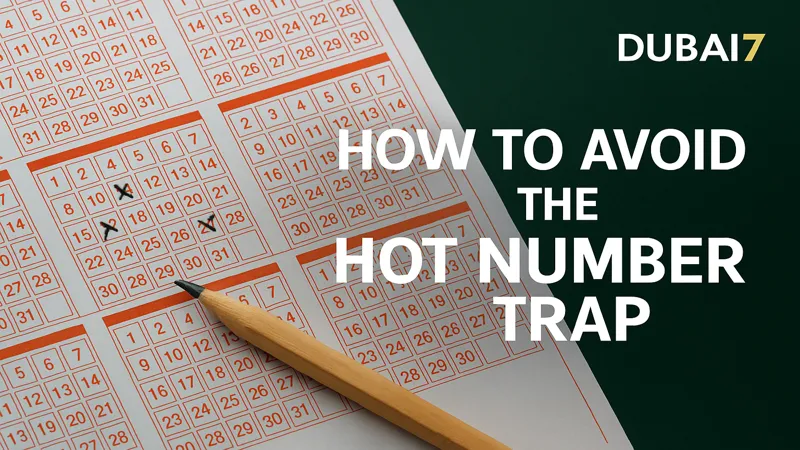
The Illusion of Hot Numbers
Every lottery player has heard of “hot numbers”—those that appear frequently in recent draws. Many assume these numbers are more likely to hit again, prompting people to chase them relentlessly. But is this belief grounded in math or myth?
According to probability experts and Dubai7’s internal analytics team, the obsession with hot numbers is often a psychological trap that leads to poor decision-making. Here’s what you need to know.
1. Believing Hot Numbers Are “Due to Hit Again”
Many players think if a number has appeared often lately, it’s on a streak and likely to continue winning. This is known as the Gambler’s Fallacy.
Reality Check:
Each lottery draw is an independent event. The chance of any number being drawn remains the same, regardless of its previous frequency.
Example:
If number 28 appeared in 3 of the last 10 draws, that doesn’t increase its odds of appearing in the next draw.
Dubai7 Tip:
Use hot/cold number charts as reference only, not as prediction tools. Their Number Analytics dashboard reminds players of probability rules before submission.
2. Over-Avoiding Cold Numbers
Some players fall into the reverse trap—completely avoiding numbers that haven’t shown up in a long time, assuming they’re “dead.”
Problem:
All numbers in a fair lottery system have equal chances. Ignoring cold numbers narrows your spread and reduces your ticket’s diversity.
Dubai7 Insight:
Statistical logs across 5,000 draws show that long-absent numbers frequently return within 5–10 draws. Smart players balance hot, cold, and neutral numbers.
3. Chasing Past Winners’ Numbers
It’s tempting to use the numbers that helped someone win a big jackpot. Many players Google famous winning combinations or copy shared screenshots online.
Why It’s Flawed:
- Replication ≠ replication of results.
- Those numbers won because of chance, not pattern.
- Highly shared numbers can lead to split prizes if multiple people win together.
Dubai7 Reminder:
Avoid copying trending combos. Their system flags “popular combos” that have a high risk of being overplayed, allowing players to adjust for higher exclusivity.
4. Ignoring Ticket Diversity
Sticking to favorite numbers, birthdays, or repeating patterns (e.g., 5, 10, 15, 20, 25) limits the potential of your ticket.
Why It’s Risky:
- Birthdays limit you to numbers 1–31.
- Linear patterns are popular—if they win, prizes are often split.
- Low-number clustering shrinks range coverage.
| Strategy | Coverage | Prize Share Risk | Flexibility |
|---|---|---|---|
| Hot-only | Low | Medium | Poor |
| Cold-only | Low | Medium | Poor |
| Mixed (Balanced) | High | Low | High |
| Copying Past Wins | Medium | High | Very Poor |
Dubai7 Suggestion:
Use their “Balanced Generator” to create mixes of:
- 2 hot numbers
- 2 cold numbers
- 2 random picks
This gives you statistical coverage and uniqueness.
How to Use Hot Numbers Wisely?
- Don’t chase them blindly.
- Mix them with other number types.
- Use as part of syndicates (more coverage with less risk).
- Set betting limits to avoid emotional play.
Dubai7 Tools:
- Hot/Cold Analytics
- Combo Pattern Alerts
- Mixed Ticket Generator
- Syndicate Smart Join Option
FAQs
Q1: Do hot numbers have higher odds of being drawn?
A: No. Every draw is independent. Hot numbers only indicate past results, not future predictions.
Q2: Should I completely avoid hot numbers?
A: Not necessarily. Include them in a balanced set—but don’t overcommit your ticket to them.
Q3: What’s the best number picking method?
A: Balanced mix: hot + cold + random. Use Dubai7’s smart picker for guidance.
Q4: Are cold numbers bad choices?
A: No. Cold numbers are often overdue for appearance. Many jackpots are won with long-absent picks.
Q5: Does Dubai7 favor any numbers?
A: No. The platform uses verified RNG draws with fair number selection. No biases.
Conclusion
Falling into the “hot number trap” is easy—but it leads to emotion-based betting instead of data-driven decisions. Remember: every number has the same chance, no matter its history.
With tools from Dubai7, you can avoid common misconceptions, build smart combinations, and maximize your coverage—giving yourself the best chance, backed by logic.

